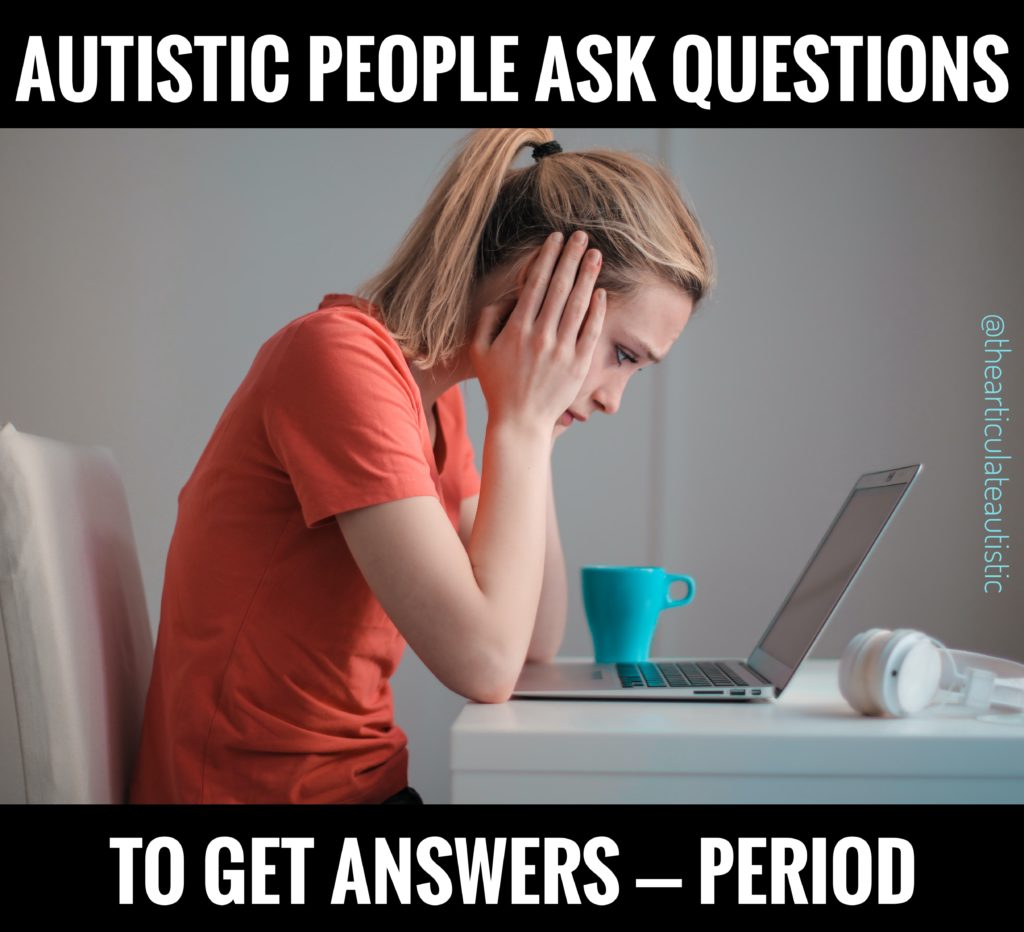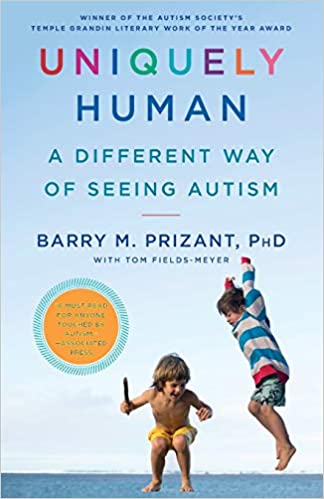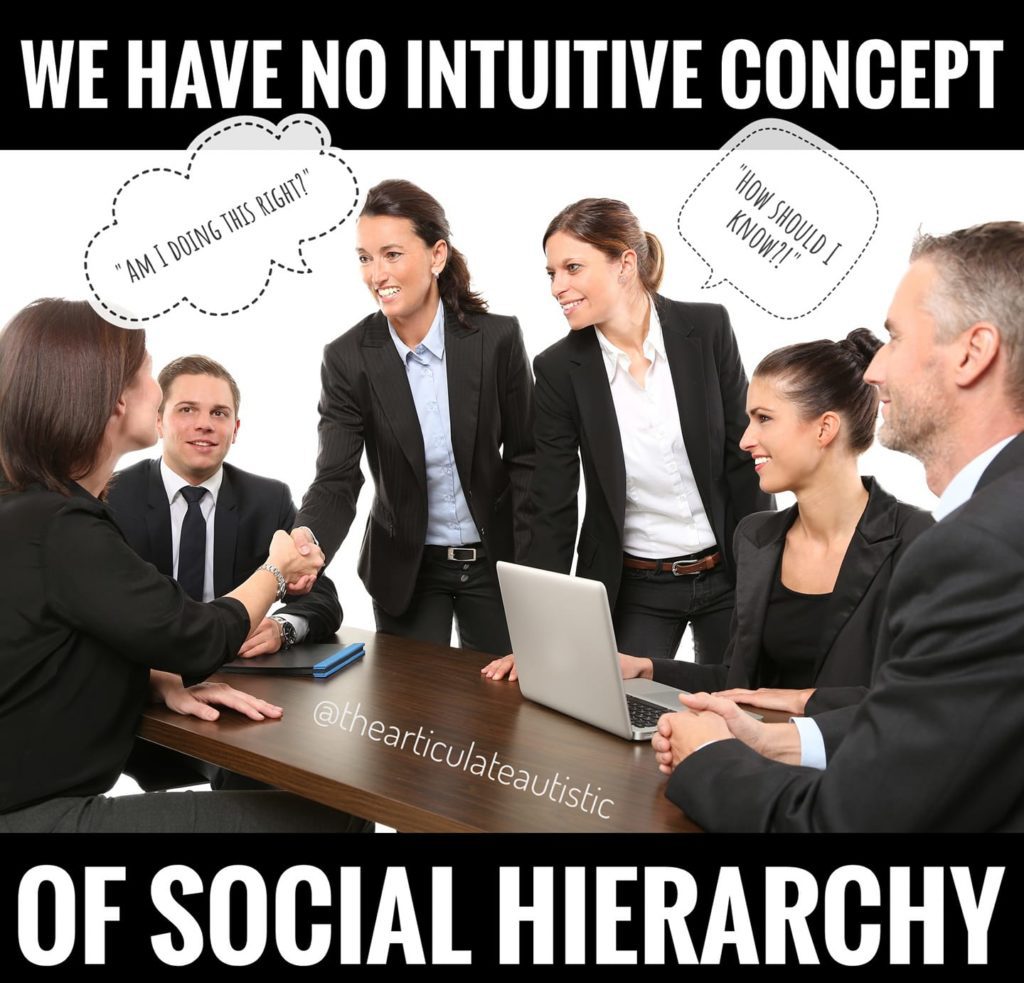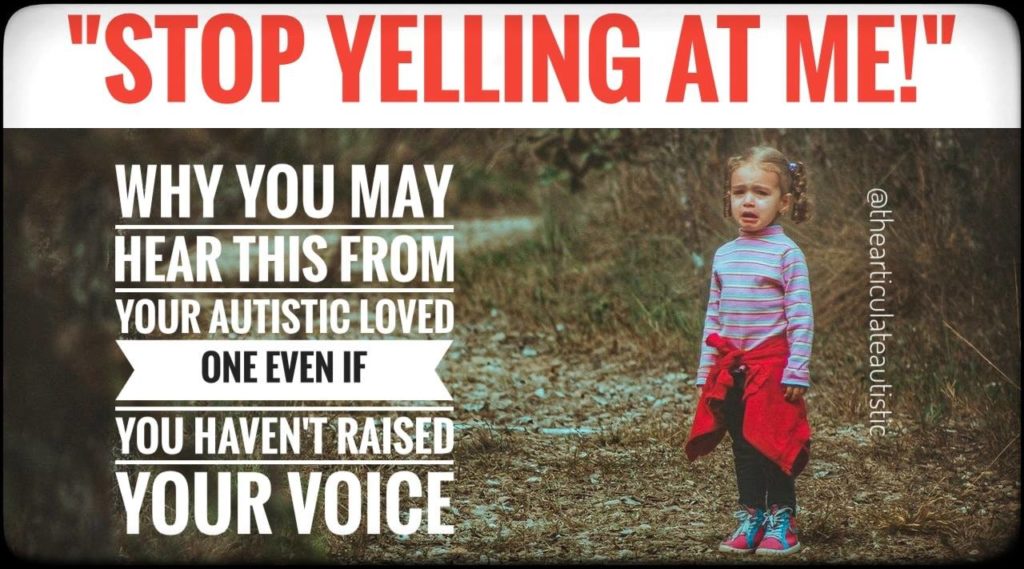Autistic People Ask Questions to Get Answers – Period

Autistic people ask questions to get answers, period. This is something I’ve talked about many times in other posts, but I’ve never given this particular topic its own voice, and I feel it’s important that I do so.
One of the most common and sometimes devastating misunderstandings that occur between autistic and neurotypical people is the one surrounding the purpose of questions.
I can’t tell you how many times during my childhood, teenage years, and young adult years that I asked a question to get an answer (the only purpose I understood questions to have at the time) and the people on the receiving end of those questions would become incredibly angry and start yelling at me, walking away from me in a huff, or physically abusing me.
Neurotypical People Use Questions Differently Than Autistic People
When an autistic person asks a question, it is an attempt to get an answer and/or fully understand and visualize a request being made of us. The question is completely literal and an attempt to understand.
There are no ulterior motives whatsoever.
Unlike their autistic counterparts, neurotypical people DO ask questions to get answers. However, neurotypical people ALSO ask questions to challenge the authority of others in a passive-aggressive way and/or to get out of doing a task.
To most autistic people, those latter uses of questions make absolutely no sense.
Many of us have spent our entire lives being confused and traumatized by the reactions others have had toward us for simply asking a question. Many of us have actually become afraid of asking questions because all we’ve known is, for some strange and inexplicable reason, it causes certain people to fly into a sudden rage.
As we get older, past trauma may keep us from asking the important questions necessary to function in adult life. We may not know the answer to something, we may not fully understand instructions, but we dare not ask just in case you, the neurotypical person we don’t know well, will be the one to unleash a terrifying fury upon us. We know we’ll get in trouble for doing “the wrong thing” later on, but, in our traumatized minds, it’s still better than daring to speak up and ask for clarification.
If your autistic loved one (or co-worker) asks you a question, they are looking for an answer. They need clarification in order to complete whatever task is being asked of them or to fully understand the story you’re telling them. These details, even if they seem trivial to you, are essential to learning and understanding for the autistic mind.
(Article continues below.)
The best way to improve communication with your autistic loved one is to understand how your autistic loved one’s mind works! Intentions, motivations, and personal expressions (facial expressions or lack thereof, body language, etc.), are often quite different in autistic people than they are in neurotypical people.
Experience a better understanding of your autistic loved one by reading books about life from an autistic perspective as well as stories that feature autistic characters. You’ll have so many “Ah ha!” moments and start seeing your autistic loved one in a different light (and you’ll have a better understanding of their behaviors, which you may have been misinterpreting up until now).
Books I recommend for a better understanding of your autistic loved one:
What to Do When An Autistic Person Asks You a Question
You’d think “answer it” would be what I would say here, and, yes, please do so. But, there’s more to it than that.
Since neurotypical people are emotionally triggered by questions in certain instances (especially in a social hierarchy situation—which, by the way, autistic people don’t intuitively understand, either), I think it’s important to briefly discuss why this happens.
Let me use an example here to illustrate the misunderstanding that happens between ND (autistic) and NT (neurotypical) people when the ND person asks a question in certain situations:
Melanie, 23, autistic, customer service agent. Sadie, 54, neurotypical, department manager.
Sadie needs assistance with a spreadsheet, so she decides to ask Melanie for help. She walks up to Melanie while she’s typing on the computer in her cubicle with a pair of earphones on her head.
Sadie: “Hi, Melanie. I need you to work on this spreadsheet for me. I’ve already talked to Mark (Melanie’s direct supervisor), and he said it’s fine for you to make this a priority. I’ll need you to put this group of employees in alphabetical and department order. Also, I’ll need you to look through the original files and take out the names of employees who no longer work here. I’ll need this by the end of the day on Friday. Is that OK?”
Melanie (startled from her task, which she was concentrating deeply on): “I’m sorry. I…I was working on something. What did you need me to do?”
Sadie (huffing in irritation): “Here, I’ll explain again.” (She explains again, the exact same way.)
Melanie (able to sense the frustration is Sadie’s energy and reacting with fear, which keeps her from fully understanding the repeated instructions): “Um, OK. So, you need me to make this a priority, and you’ll need it by Friday?”
Sadie: “Yes.” (She turns to walk away.)
Melanie: “Wait. Do you want the employees just in this department or in the entire company?”
Sadie (who feels she explained this twice): “As I said, I’ll need you to put this group of employees in alphabetical and department order.”
Melanie (hearing the edge of irritation in the way Sadie said “department” and further fighting a fight-or-flight response in her gut while also trying to mask and listen to instructions): “OK. Gotcha. So, do you want just this building, or did you want me to include the satellite offices, as well?”
Sadie (who knows she never said anything about satellite offices, and if Melanie just looked at the original spreadsheet, she’d see on the top that it clearly states that it’s only a list of employees from this particular building): “Look at the top of the spreadsheet. What does that say?”
Melanie (nervous): “Um…I see ‘ACME Corporation Employee List 2019.”
Sadie (starting to wonder if Melanie is messing with her): “I mean the top right. What does the top right of the spreadsheet say?”
Melanie (even more nervous): “Oh, of course. Um…I see Location 01?”
Sadie: “Yes. Location 1.”
Melanie (unsure that she fully understands and not wanting to make a mistake): “So, you want a list of employees in alphabetical order by department for this building only?”
Sadie (visibly irritated now): “Yes.” (She says this through clenched teeth and an intimidating smile that doesn’t reach her eyes.)
Melanie (noticing something else on the spreadsheet): “Are you sure?”
Sadie (her mouth dropping open and her eyes popping wide): “Am I SURE?! I’ve been working at this company for 15 years. Of course, I’m sure! Who are you to question me??”
Melanie (white as a sheet with terror, selective mutism taking over): “Um…I…um…I…”
Sadie (continuing her tirade): “Why are you asking so many questions? What? Are you trying to get out of the project, or something, or do you just have trouble respecting authority? I’m going to have a talk with your manager.”
Sadie storms off, and Melanie sinks back into her chair, tears silently streaming down her face. Belatedly, she points a well-chewed fingernail toward the second page of the spreadsheet where a dog-eared part of the paper reveals at the top right: Location 02. This is why Melanie asked if Sadie was sure because Location 2 is also on the spreadsheet, and what Sadie was saying versus what was on the spreadsheet did not match, further confusing Melanie.
Sadie, being an older, seasoned employee and a manager, has certain expectations for how she should be treated by staff who are considered “under” her.
In neurotypical society, social hierarchy is very important and lack of adherence to unwritten and unspoken rules around this is considered disrespectful.
Sadie couldn’t understand why Melanie was “questioning her” and, she became very upset when asked if she “was sure” because for someone who is considered lower than her on the social hierarchy totem poll (she’s an older and seasoned manager while Melanie is a 20-something customer service representative) to ask “Are you sure?” is the verbal equivalent of a slap in the face!
Melanie, for her part, was taken aback at the initial interruption, and, being autistic, she wasn’t able to switch her focus quickly enough to be able to take in everything Sadie was saying to her in such a rapid-fire way. Moreover, as soon as Melanie caught that Sadie was irritated with her (most of us can feel energy, and it is our primary language), it was all downhill from there.
Melanie, who was already having difficulty understanding what was being asked of her to begin with, developed increased anxiety that was further keeping her brain from doing what she wanted it to do.
The entire communication broke down. Sadie walks off thinking this young woman is rude, incompetent, or both, and Melanie is traumatized and has gone temporarily mute, so she can’t even defend herself, which further compounds the issue.
The Takeaway
Autistic people ask questions to get answers, to fully understand what is expected of us and why. If we don’t know “why”, we often won’t be able to make a logical connection in our brains and remember to do whatever task we are being asked to do. (I know I didn’t bring it up in this example, but “Why?” can be just as offensive to many neurotypical people in social hierarchy settings as “Are you sure?”)
Again, the neurotypical person mistakenly believes that the autistic person is questioning them and trying to undermine their authority when, in fact, they are simply trying to understand what’s expected of them in a world that is already incredibly confusing to begin with.
Follow me on Instagram.
Want downloadable, PDF-format copies of these blog posts to print and use with your loved ones or small class? Click here to become a Patreon supporter!













My 2 grown up kids are autistic and ask a lot of questions. My communication style is rather vague and waffly! so sometimes I am not clear about what I might want them to do. So I get lots of questions which can make me feel defensive. If I step back what it highlights is that I have to communicate to them in a way they better understand and also invite questions so they have the confidence to clarify. They are qucik to remind me of the social hirearchy and it does take time to recognise it is not disrespect. I guess some people are always going to struggle with how Autistic people do ask questions.
I almost cried when I read this. It’s basically an ongoing theme in my life and causes a great deal of anxiety. There have been times when I have tried to fill in the gaps instead of asking because I kept getting the “as per my last email” passive-aggressive response. So 5 or so hours later, after driving myself nuts, I ask the person who I am helping for more details. At this point, my frustration of spending hours trying to figure out his instructions outweighs the fear of passive-aggression I might receive, so I just go ahead and ask. And lo and behold, there was either information missing, or instructions that were contradictory. Five hours for a task that would have taken 10 minutes if I wasn’t afraid to ask. These are the same people who will say “There are no stupid questions!” and then treat you like your questions ARE stupid. Shaking my head over here. I was employed in this job because of my pedantic attention to detail and ability to track inconsistencies. But still, get told off for exercising that very skill. No wonder we’re all exhausted, right?
I understand completely. It’s so painful and confusing to not being able to ask questions without reprisal.
I am now retired so away for such situations but have been there in the past. I can fully empathise with Melanie in the story.
I read this article and instantly connected to it. My previous manager explained the social hierarchy structure to me in the workforce because she recognized I didn’t really understand it. Ever since I was a kid, I’ve always had really bad anxiety surrounding asking questions. Often times when I’m too overwhelmed I go mute and find it almost impossible to communicate. Neurotypicals are often not clear with their instructions and this is part of the reason why workplace communication/management is often bad. Please just answer my questions.
great article 🙂 totally agree…asking qs makes things very clear
My name is Kristi, my son has autism. I’ve completely connected to your writings. We live in WV, and there just isn’t much help for families dealing with ND kids. The only places that I know of, are between an hour and a half to four hours away. The school system tries their best, but there isn’t adequate funding for our schools for NT students, much less kids with special needs. The way I learned about ASD was by researching, or by reading treads. I Google everything! This is the first time I’ve commented on someone’s page. My son is exactly as you describe, but it infuriates him to be asked questions. I have always told him to “ask”, if he doesn’t understand something. I’ve always told my son to tell new people that he has autism, however my husband disagrees with me. He says, that I shouldn’t point it out, because he had been made fun as a child ’cause he is dyslexic. I know he feels shame from that, and I told him that there’s no shame in it. People didn’t understand dyslexia back then, like how a lot of people don’t understand autism know. I told my husband, that if our son tells new people that he is autistic “they” are going to be more understanding in his response. I just said that a lot of people don’t know about ND children, but there’s also a lot of people that have heard about it. To me, telling my son to say, “I have autism”; gives him a chance to illuminate people about ASD. Thank you for sharing! Kristi D.S.
Ah By God WV. Beautiful woods and hills, right? And a little rocking band from Morgantown… with a neurodivergent guitarist. But I digress! Autism is not a disease, you cannot ‘have Autism’. With respect to your responsibilities as a mother, please learn about the semantics of the terms. The (still relatively-nascent) Autism rights movement is aiming to prevent the massive dehumanisation of Autistic people via seeing them as problems to be solved or disabled and nothing more. So, logically and empathically speaking: one can BE an Autistic human being, but not ‘HAVE’ Autism. One can have cancer, but not be cancerous. You have brown eyes, but you are not a brown eyes human. See the difference? Because it sounds like you taught your son to go around pre-emptively making excuses for himself. So your husband is at least half-right. Although sure, it shouldn’t be something that people are closeted about, I can agree. Personally, because I am a grown male and that makes me fair game in their eyes (misandry is overlooked in society) I have had some pretty nasty people use my admission of Autism as a way of targeting their abuse more specifically to press my buttons. So long-term be aware of that please. Not everyone WANTS to be understanding and there’s a reason I abhor wilful ignorance and hypocrisy in people. Apologies if you have had more expert help with this than I am aware of.
Respectfully, it’s none of your business how she writes. It’s not your place to correct her here. This is why I, as an autistic woman, despise autistic activism, because it’s so pompous and condescending. You basically are gatekeeping by policing people’s language. Not all autistic people use identity-first language, and you have no business telling them to do so. The fact that you automatically jumped to “willful ignorance” with no knowledge of this woman or her experiences speaks volumes. I’m sick of the pedantry and petty politics in the autism community.
Boy this is so true. Questions from autistic people are often misinterpreted when they are wrongly interpreted as having underlying meaning and messaging. Your article outlines clearly the intent of the question in this scenario, which is so important when considering an appropriate response! But NT people can get impatient, that is observed in your description above. For Melanie in the above example, it might be helpful to add (before asking another question) to explain that she is seeking clarification because she wants to ensure the task is completed correctly (thereby providing the listener with the intent of her questioning).
I agree, it does help. It’s masking, but it does help. I can also be considered a social compromise.
Reading this made me cry. I know it night seem simple, but the majority of the fights I’ve gotten into and write ups for “not respecting authority” are because of this.
It even happens in reverse. A loved one will ask me a question, and I’ll go to answer it. This often makes them start screaming over my answer, often repeating the same question over and over.. but they’re screaming and interrupting me when I’m trying to answer so I either meltdown or shutdown. Further adding to their belief that I’m just a drama queen and picking fights.
The simple fact that someone out there understands my point of view in this is.. I can’t think of the words to describe it. Amazing. Bittersweet? A relief? Thank you.